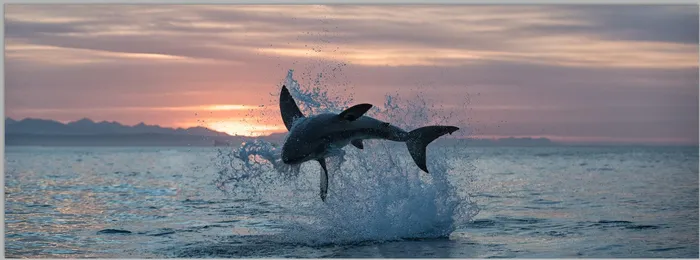This week, the world observed International Day for Biological Diversity and South Africa is faced with a harsh reminder of what’s at stake with the dramatic disappearance of the Great White Shark from its once-thriving hunting grounds in False Bay. The United Nations marked May 22 as a day to reflect on the critical importance of biodiversity as a yardstick for humanity and the planet.
Few symbols are as powerful or as endangered as the Great White Shark, and thanks to breakthrough research, it’s now possible to put a monetary value on the true cost of biodiversity loss such as this.

Without urgent protections, the disappearance of Great Whites could mean further collapse of marine species populations, economic loss to tourism and fisheries, and deeper disruption to South Africa’s ocean ecosystems.
Image: Chris Fallows
Once a common sight in False Bay, Great White Sharks have all but disappeared over the past two decades. Scientists point to unsustainable fishing and commercial longlining, entanglement in protective nets laid out by the Natal Sharks Board, and more recently, predation by orcas as the reason Great Whites have vanished from our coast. Their absence has triggered a domino effect across the marine ecosystem.
A 20-year study by scientists from the University of Miami has uncovered real-world evidence of a food chain collapse. “The loss of this iconic apex predator has led to an increase in sightings of Cape fur seals and sevengill sharks, which in turn has seen a decline in the species they feed on. This confirms the longstanding ecological theory—top predator loss leads to cascading impacts,” said lead researcher, Dr. Neil Hammerschlag
The shift has allowed Cape fur seal and seven-gill shark populations to flourish unchecked, placing additional pressure on small fish, sharks, and other prey. Researchers using underwater video surveys, citizen science observations, and long-term boat-based sightings revealed drastic changes in species behaviour and abundance, indicating elevated stress on the ecosystem.
“We are losing the Lions of our Ocean”, said South Africa’s prolific wildlife photographer Chris Fallows.
Beyond the obvious ecological damage, the loss of Great Whites is a multi-million-dollar blow to South Africa’s economy. An independent biodiversity valuation of the Great White Shark population off the Western Cape was commissioned by Californian NGO Shark Allies, and conducted by Endangered Wildlife OÜ, a pioneering “tech for good” fintech based in Europe. Their revolutionary Biodiversity Valuator SaaS platform uses novel algorithms, credible data sources, and AI- powered analytics to assign financial value to individual species in specific locations.
The report places the total conservation value of the Western Cape’s white shark population at over USD 241 million or R4.3bn and states that: In 2019, the shark tourism industry was valued at over R1 billion (USD 69 million), supporting hundreds of jobs and thousands of livelihoods. Great Whites are also global media stars featured in Shark Week, SharkFest, and eco-films that bring millions in exposure and filming revenue to the region. Without these apex predators, the resulting seal population boom and fish stock collapse could further destabilize commercial fisheries, already under threat from environmental changes.
“Perception drives value. We’ve created the world’s first AI-supported tool that allows companies, investors, and governments to understand what a species like the Great White is actually worth—to ecosystems, to economies, and to future generations,” said Endangered Wildlife OÜ CEO Shana Vida Gavron.
As international reporting standards increasingly require biodiversity risk disclosure, Endangered Wildlife OÜ’s Biodiversity Valuator is filling a major gap in the ESG reporting landscape. By quantifying nature’s worth, the platform helps corporates and governments assess impact returns and drive investment in conservation.
“Consumers have become more eco-conscious but likewise, based on multiple studies, more sceptical due to corporate greenwashing. The ability to value impact means that a company has an alternative means of expressing positive and negative biodiversity impact. Therefore, the valuation can be used for external communication to stakeholders as a means of demonstrating a company’s alignment with changing needs and regulations,” Vida Gavron added.
As the UN calls on the world to “Be part of the plan” this International Day for Biological Diversity, the fate of the Great White Shark reminds us that biodiversity loss isn’t just a scientific concern, it’s a financial risk and a societal cost.
“Sharks may inspire fear, but their loss should inspire greater concern. They are vital not just to ocean health, but to the livelihoods, culture, and economy of South Africa,” said Dr. Hammerschlag.
Related Topics: